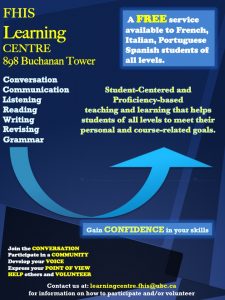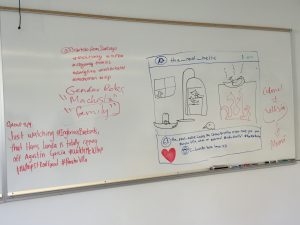SPAN 221 ofrece una comprensión elemental y comprensiva del análisis literario sobre la base de textos españoles e hispanoamericanos. Se introducirán los principales géneros literarios (poesía, ensayo, narrativa, drama) con su correspondiente terminología del lenguaje literario. Además se situarán a los autores y los textos en sus contextos históricos, geográficos, políticos y culturales. Please see the most recent syllabus for this course here: Syllabus Spanish 221 T 1 2018
Author Archives: Brianne Orr Alvarez
Protected: Spanish 365: Modern Magics
Arts Oneb: Authority and Resistance
ArtsONEb is an invitation to unpack why “authority and resistance” has concerned some of the most noteworthy thinkers and revolutionary actors of the past and defined recent thematic trends in the arts, politics, and beyond. It is an opportunity to actively engage in a dialogue – both through conversation and written work in an academic context – about the value of looking to the past to better comprehend present circumstances and even to project future occurrences. See the current course syllabus for my section here: Authority and Resistance Syllabus 2017
History of Courses Taught
The University of British Columbia
First Year Programs, Arts One
- Authority and Resistance
Department of French, Hispanic, and Italian Studies
- Spanish 491 Directed Study on Colonial Literature
- Spanish 405a/505 Latin American Guerrilla Literature
- Spanish 406 Gender Representations in Latin American Literature
- Spanish 401 Translation
- Spanish 365 Introduction to Spanish American Literature (1820s-present)
- Spanish 364 Spanish-American Literature (up to 1820s)
- Spanish 312 Latin American Literature in Translation (Taught in English)
- Exploring Politics through Literature
- Violence: Latin American Testimonial Narrative and Documentary
- Spanish 280: Snapshots of Revolution in Spanish America (Taught in English)
- Spanish 222 Hispanic Cultural Expressions
- Spanish 221 Introduction to Hispanic Literature and Methods of Literary Analysis
- Spanish 202 Intermediate Spanish II
- Spanish 201 Intermediate Spanish I
- Spanish 102 Novice Spanish II
- Spanish 101 Novice Spanish I
The University of Arkansas at Little Rock
Department of International and Second Language Studies
- Spanish 3312 Mass Media and Society in Spanish American Literary and Cultural Texts
- Spanish 4362 From Literature to Film in Spanish American Literature
- Spanish 4361 (Re)Writing Revolution (Latin America)
- Spanish 3335 Culture and Popular Culture of the Americas
- Spanish 3332 Introduction to Hispanic Literature
Michigan State University
The Centre for Integrative Studies in the Arts and Humanities
- IAH 211C Identity Politics and Human Rights in 20th Century Literature on the Revolution
- IAH 203 Latin America and the World
Department of Spanish and Portuguese
- Spanish 310 Basic Spanish Grammar
- Spanish 250 Intensive Review of Intermediate Spanish I & II
- Spanish 202 Second Year Spanish II
- Spanish 201 Second Year Spanish I
- Spanish 150 Intensive Review of Elementary Spanish I & II
- Spanish 102 Elementary Spanish II
- Spanish 101 Elementary Spanish I
Lansing Community College
Department of Communications
- Spanish 121 Elementary Spanish I
- Spanish 116 Conversational Spanish II
Teaching Writing
Blogs
Beyond this ePortfolio site, I have a blog called Quare that reflects on intuitive approaches to and practices in teaching and learning. I also manage the FHIS Learning Centre Blog, Beyond the Page. This site hosts helpful tips for students learning additional languages (mainly Spanish) and provides links to the centre’s online schedule, which you can also find here.
Graduate Training Assistant Training
FHIS Learning Centre

The FHIS Learning Centre
The FHIS Learning Centre is a volunteer-based centre, staffed by students enrolled in FHIS undergraduate or graduate courses. It services students in all of the languages taught in the FHIS Department – French, Italian, Portuguese, and Spanish – and at all levels of our curricula (from novice language courses to advanced language and literature ones).
A Holistic and Community-Oriented Approach to Student Engagement
The FHIS Learning Centre is informed by an integrative holistic approach to the teaching of foreign language sand literatures that hones in on key skills needed for effective communication in classroom-created and real-life contexts. This communicative and community-oriented focus of the operation has been successful at creating an open and interactive learning community for students that is closely aligned with specific course learning objectives and abilities needed for effective and authentic communication in the target language.
The Director’s Role
I currently serve as Director of the FHIS Learning Centre. As director, I collaborate with the Learning Centre Coordinator to train and provide professional development for tutors and lead the recruitment and selection process of student volunteers. I routinely collect data on student experiences through participation counters, session reflections, tutor surveys, and focus groups to ensure that student, tutor, and faculty feedback is taken into account for upcoming sessions and programming. The centre, as promoted in national and international standards for teaching and learning additional languages (i.e. ACTFL and CEFR) strives to innovate approaches to additional language instruction in small-group settings and to increase student confidence, proficiency, and readiness for applying knowledge to a real-world context in a way that is also aligned with FHIS course and program learning outcomes.
Go here to learn more about this service and what we do.
Presentations
Here, I’ve included a sampling of original class sessions, influenced by inquiry-based teaching methods and other technologies that I have designed for UBC students on different topics, relevant to their coursework and other aspects of their degree programs.
Arts Oneb: Authority and Resistance Lectures and class meetings
- Lecture: Ernest Hemingway and For Whom the Bell Tolls
- Hemingway For Whom the Bell Tolls
- The end of Plato and the Myth of Er
- Antigone 1
Spanish Language and Hispanic Studies Classes
- Spanish 201 Subjunctive in review
- Introducción a la lección 1 Span 201 2018
- 2018 ANÁLISIS ESTRUCTURAL DE LA POESÍA (Span 221)
- Spanish 222 Introduction to Graffiti
- Spanish 221 Federico García Lorca e intro a la Casa de Bernarda Alba
- Introduction to the Cuban Revolution and Cuban Writing
- Spanish 280 Nellie Campobello Men of the North

In the Classroom
My teaching has been informed by a number of methods and approaches and is often enhanced by technology. I primarily employ a Communicative Approach that incorporates other teaching methods such as Jean-Pol Martin’s Learning by Teaching Method and other inquiry-based and collaborative learning models that are complemented by Power Point and Prezi presentations, music and film, discussion-oriented platforms and blogs, podcasts, interactive lecture tools and games. Also, since I have found that learning through reading and writing helps to foster a(n) (inter)disciplinary community in the classroom, my pedagogy actively engages students of all levels in the curriculum with such practices.
The collection of class presentations (PPT) and in-class activities included in this section demonstrate my student-centered and collaborative approach to teaching and learning, which tends to privilege active (rather than passive) learning practices. In my classrooms, students are required to think, answer and pose questions, collaborate regularly with classmates, lead classroom activities (Discussion Leader Sessions), and moderate class discussions both in the classroom and online through a class-based discussion forum. This varied, but highly interactive approach to teaching in general creates a learning environment that promotes the “five C’s” that have greatly contributed to my success as an educator up to this point: communication, context-based learning. cross-cultural and disciplinary connections, community, and comfort – not in the warm, fuzzy way, but in the sense of creating an environment driven by active participation, mutual respect, and an easy expression of ideas.